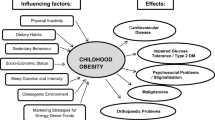Abstract
Overweight and obesity are epidemic in the United States, particularly among minority populations. This epidemic contributes to the development of chronic conditions that occur later in life such as type 2 diabetes and hypertension. Therefore, it is important to identify factors associated with the development of obesity during young adulthood. We conducted a cross-sectional survey among students graduating from a Historically Black College or University (HBCU) in the Mid-Atlantic region. Participants were 392 predominantly African American seniors graduating in the spring of 2003. Data were collected using a self-administered paper and pencil questionnaire which focused on weight, weight management activities, individual and familial weight history, and health status indicators. Participants were on average 24 ± 5 years of age and 69% female; over 90% identified as African American or Black. According to NIH guidelines, about 30% of males and 28% of females were considered overweight, 12% of males and 7% of females were considered obese, and 7% of males and females were considered extremely obese. Significant correlates of being more overweight were being married, having children, lower socio-economic status, weight-loss attempts, personal and family history of overweight, and poorer health status. These data suggest that among this sample, the prevalence of overweight and obesity is similar to other populations of young African American adults. Familial factors such as socio-economic status and family weight history were important correlates of overweight. Overweight is a significant problem in this population, and these data should be useful for developing weight loss interventions aimed at young adults.
Similar content being viewed by others
References
Mokdad AH, Bowman BA, Ford ES, Vinicor F, Marks JS, Koplan JP. The continuing epidemics of obesity and diabetes in the United States. JAMA. Sep 2001 12;286(10):1195–1200.
Harris MI. Diabetes in America: epidemiology and scope of the problem. Diabetes Care.Dec 1998;21(Suppl 3):C11–C14.
Pi-Sunyer FX. Obesity and diabetes in blacks. Diabetes Care. Nov 1990;13(11):1144–1149.
Carter JS, Pugh JA, Monterrosa A. Non-insulin dependent diabetes mellitus in minorities in the United States. Ann Intern Med. Aug 1996 1;125(3):221–232.
National Institutes of Health – NIDDK. Diabetes in African Americans. Diabetes in America, second edition. No. 95–1468 ed. 1995. p. 613–629.
Dreeben O. Health status of African Americans. J Health Soc Policy. 2001;14(1):1–17.
Lowry R, Galuska DA, Fulton JE, Wechsler H, Kann L, Collins JL. Physical activity, food choice, and weight management goals and practices among U.S. college students. Am J Prev Med. 2003;18(1):18–27.
Norman JE, Bild D, Lewis CE, Liu K, West DS. The impact of weight change on cardiovascular disease risk factors in young black and white adults: the CARDIA study. Int J Obes Relat Metab Disord. Mar 2003;27(3):369–376.
National Heart LaBI. Clinical guidelines on the identification, evaluation and treatment of overweight and obesity in adults. The evidence report. NIH 1998;98–4083.
Ireys HT, Gross SS, Werthamer-Larsson LA, Kolodner KB. Self-esteem of young adults with chronic health conditions: appraising the effects of perceived impact. J Develop Behav Pediatr. 1994;15:409–415.
Ireys HT, Werthamer-Larsson LA, Kolodner KB, Gross SS. Mental health of young adults with chronic illness. J Pediatr Psychol. 1994;19:205–222.
Stata Corp. Stata Statistical Software. Stata Corporation 2003;Release 7.0 College Station, Texas.
Averett S, Korenman S. Black–white differences in social and economic consequences of obesity. Int J Obesity. 1999;23:166–173.
Rosenberg L, Palmer JR, Adams-Campbell LL, Rao RS. Obesity and hypertension among college-educated black women in the United States. J Human Hypertens. 1999;13:237–241.
Rosenberg L, Palmer JR, Wise LA, Horton NJ, Kumanyika SK, Adams-Campbell LL. A prospective study of the effect of childbearing on weight gain in African-American women. Obes Res. Dec 2003;11(12):1526–1535.
Villanueva EV. The validity of self-reported weight in US adults: a population-based cross-sectional study. BMC Public Health. 2001;1(11).
Kumanyika S. Obesity in black women. Epidemiol Rev 1987;9:31–50.
Kumanyika SK, Ewart CK. Theoretical and baseline considerations for diet and weight control of diabetes among blacks. Diabetes Care. Nov 1990;13(11):1154–1162.
Kumanyika SK, Morssink C, Agurs T. Models for dietary and weight change in African-American women: identifying cultural components. Ethn Dis. 1992;2(2):166–175.
Kumanyika SK. Special issues regarding obesity in minority populations. Ann Intern Med. Oct 1993 1;119(7 Pt 2):650–654.
Kumanyika SK. Obesity in African Americans: biobehavioral consequences of culture. Ethn Dis. 1998;8(1):93–96.
Kumanyika S, Wilson JF, Guilford-Davenport M. Weight-related attitudes and behaviors of black women. J Am Diet Assoc. Apr 1993;93(4):416–422.
Kumanyika S. The minority factor in the obesity epidemic. Ethn Dis. 2002;12(3):316–319.
Acknowledgements
The authors would like to acknowledge Yvonne Bronner, Connye Kuratko, Shaquana Divers, Kia Tolson, Terry Sears, Edna Green, and Donna Baird for their help with the planning for the study, data collection, and data entry. We also thank the college students whose cooperation made this research possible.
This work was supported by grants from the National Institutes of Health, National Center on Minority Health and Health Disparities (NCMHD) (1P60MD000214-01, 5P60MD00217-02, U24DA12390-04).
Author information
Authors and Affiliations
Corresponding author
Additional information
Gary is with the Department of Epidemiology, Johns Hopkins Bloomberg School of Public Health, Baltimore, MD, USA; Gross and Browne are with the Public Health Program, Morgan State University, Baltimore, MD, USA; LaVeist is with the Department of Health Policy and Management, Johns Hopkins Bloomberg School of Public Health, Baltimore, MD, USA; Gary, Gross, Browne, and LaVeist are with the Morgan-Hopkins Center for Health Disparities Solutions, Baltimore, MD, USA.
Rights and permissions
About this article
Cite this article
Gary, T.L., Gross, S.M., Browne, D.C. et al. The College Health and Wellness Study: Baseline Correlates of Overweight among African Americans. JURH 83, 253–265 (2006). https://doi.org/10.1007/s11524-005-9026-1
Published:
Issue Date:
DOI: https://doi.org/10.1007/s11524-005-9026-1



